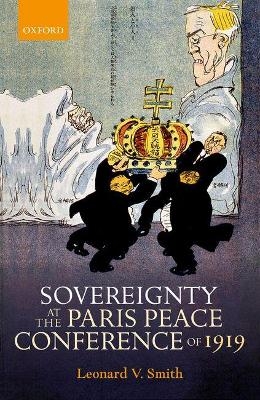
Sovereignty at the Paris Peace Conference of 1919
Oxford University Press (Verlag)
978-0-19-967717-7 (ISBN)
We have known for many decades that the Paris Peace Conference of 1919 "failed", in the sense that it did not prevent the outbreak of World War II. This book investigates not whether the Paris Peace Conference succeeded or failed, but the historically specific international system it created. It explores the rules under which that system operated, and the kinds of states and empires that inhabited it. Deepening the dialogue between history and international relations theory makes it possible to think about sovereignty at the Paris Peace Conference in new ways. Sovereignty in 1919 was about not just determining of answers demarcating the international system, but also the questions. Sovereignty in 1919 was about remaking the world.
Most histories of the Paris Peace Conference stop with the signing of the Treaty of Versailles with Germany on 28 June 1919. Sovereignty at the Paris Peace Conference of 1919 considers all five treaties produced by the conference as well as the Treaty of Lausanne with Turkey in 1923. It is organized not chronologically or geographically, but according to specific problems of sovereignty. A peace based on "justice" produced a criminalized Great Power in Germany, and a template problematically applied in the other treaties. The conference sought to unmix lands and peoples in the defeated multinational empires by drawing boundaries and defining ethnicities. The conference sought not so much to oppose revolution as to instrumentalize it in the new international system. The League of Nations, so often taken as the supreme symbol of the failure of the conference, is better considered as a continuation of the laboratory of sovereignty established in Paris.
Leonard V. Smith is Frederick B. Arz Professor of History at Oberlin College, Ohio. He has previously written extensively about France and the Great War. His first book, Between Mutiny and Obedience: The Case of the French Fifth Infantry Division During World War I (1994) won the Paul Birdsall Prize from the American Historical Association. France and the Great War, 1914-1918 (co-authored with Stéphane Audoin-Rouzeau and Annette Becker, 2003) won the Norman B. Tomlinson Prize from the Western Front Association. Smith is also the author of The Embattled Self: French Soldiers Testimony of the Great War (2007).
Introduction: The Riddles of Sovereignty at the Paris Peace Conference
1: The Agents and Structures of Peacemaking
2: The Sovereignty of Justice
3: The "Unmixing" of Lands
4: The "Unmixing" of Peoples
5: Mastering Revolution
6: Sovereignty and the League of Nations, 1920-1923
Conclusion: History, IR, and the Paris Peace Conference
| Erscheinungsdatum | 17.04.2018 |
|---|---|
| Reihe/Serie | The Greater War |
| Zusatzinfo | 17 black and white figure/illustrations |
| Verlagsort | Oxford |
| Sprache | englisch |
| Maße | 164 x 243 mm |
| Gewicht | 608 g |
| Themenwelt | Geisteswissenschaften ► Geschichte ► Regional- / Ländergeschichte |
| Sozialwissenschaften ► Politik / Verwaltung ► Europäische / Internationale Politik | |
| ISBN-10 | 0-19-967717-4 / 0199677174 |
| ISBN-13 | 978-0-19-967717-7 / 9780199677177 |
| Zustand | Neuware |
| Haben Sie eine Frage zum Produkt? |
aus dem Bereich


